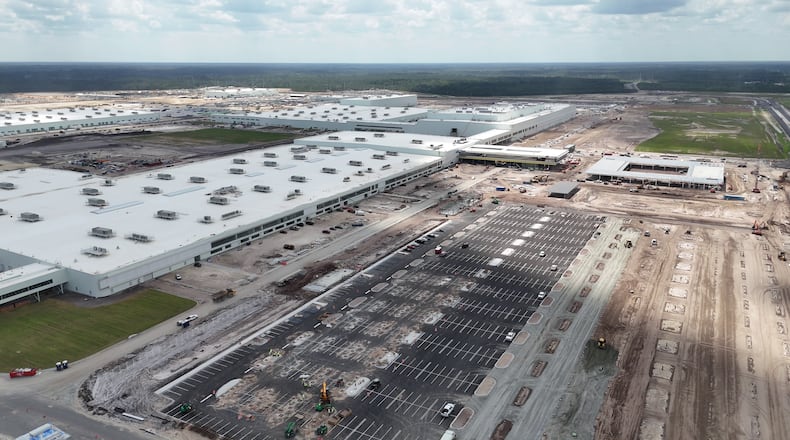Savannah’s top economic development official often says “the clock is ticking” when asked about the long-term solution to supplying water to the Hyundai electric vehicle factory.
That deadline just got 10 years closer.
The Savannah Joint Development Authority late Monday announced a legal settlement with an environmental group, the Ogeechee Riverkeeper, that had challenged water withdrawal permits for four wells tapping into the Floridan aquifer, a 100,000-square-mile underground reservoir. Those permits, issued in October by the Georgia Department of Natural Resources, required economic development and local government officials to develop and bring into operation a water supply system that does not draw from those wells within the next 25 years.
Under the agreement made public Monday, the Savannah Joint Development Authority will fast-track bringing the new water source online within the next 15 years — or by October 2039. The development authority also agreed to additional water quality sampling from the new wells.
“This agreement demonstrates that environmental protection and smart growth are not mutually exclusive,” Ogeechee Riverkeeper Executive Director Damon Mullis said.
The settlement signals the Savannah Joint Development Authority, which is a consortium of economic development authorities from Bryan, Bulloch, Chatham and Effingham counties, is finalizing plans to supply water from the Savannah River to the Hyundai site. The automaker’s factory, which opened in October, is 9 miles from the closest connection to the only existing water system with the capacity to supply the site and nearly 20 miles from the closest river water intake facility.
The Savannah JDA and local governments face an April 7 deadline to submit a water supply plan to state regulators.
“The governor, the JDA and others have been working on a surface-water solution for years,” said Trip Tollison, CEO of the Savannah Economic Development Authority. “We are at a point where we feel confident that we can make it happen within the next 15 years.”
Credit: Hyundai Motor Group Metaplant America
Credit: Hyundai Motor Group Metaplant America
Construction is underway on two of the four wells that will supply up to 4 million gallons of water daily to Hyundai along with an additional 2 million-plus gallons for other growth near the plant. Those wells are expected to be operational by the end of the second quarter and ahead of the opening of an EV battery manufacturing facility being built next to the vehicle assembly factory.
The wells have faced public resistance since they were announced in late 2022. The state is barred from issuing new water withdrawal permits from the Floridan aquifer near the Hyundai plant due to a decade-old legal settlement spurred by overpumping in Savannah. Those restrictions forced the Savannah JDA to locate the wells in neighboring Bulloch County, where new permits are allowed.
The well sites are surrounded by farmland, and area crop growers raised alarms upon learning the new wells will lower the water table. Many farmers use water from the aquifer to irrigate their fields.
Credit: Stephen B. Morton for The Atlanta Journal Constitution
Credit: Stephen B. Morton for The Atlanta Journal Constitution
Those property owners joined a community activism group, the Bulloch Action Coalition, to challenge the well permits. The effort resonated with voters, and three coalition members unseated incumbents in Bulloch County Commission elections last year.
The deal with the Ogeechee Riverkeeper doesn’t satisfy the Bulloch activists. Their spokesman, Lawton Sack, said the settlement leaves unanswered many questions that they hoped would be addressed in a trial. They intend to move forward with a petition drive launched last fall meant to trigger a pair of ballot referendums allowed under the citizens’ referendum clause of the Georgia constitution. A similar initiative led to a 2022 vote in Camden County that blocked a proposed spaceport.
The Bulloch Action Coalition hopes to have enough signatures by Feb. 2 to call for referendums.
About the Author
Keep Reading
The Latest
Featured







